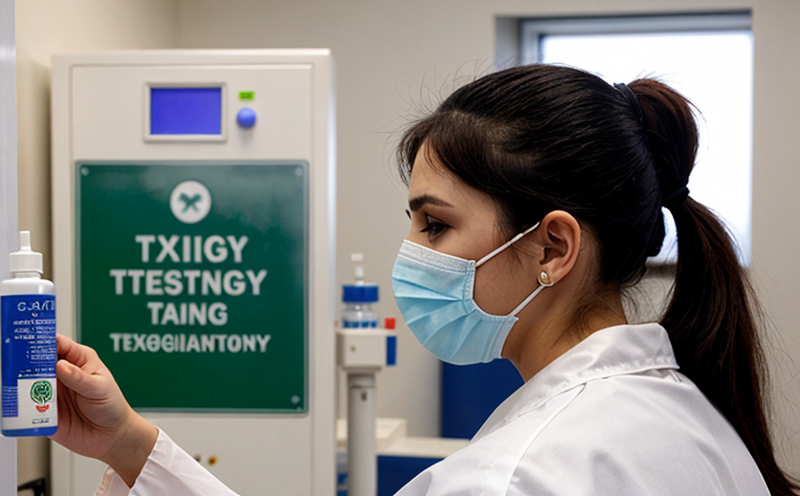Respiratory Sensitization Testing
The process of respiratory sensitization testing is a critical component in ensuring that pharmaceutical products are safe and do not cause adverse effects upon inhalation or contact with the respiratory tract. This service is essential for meeting regulatory requirements set by health authorities worldwide, including the European Medicines Agency (EMA), U.S. Food and Drug Administration (FDA), and others. The testing aims to identify substances capable of causing allergic reactions in the lungs following repeated exposure.
Respiratory sensitization occurs when a substance interacts with the immune system after initial exposure, leading to an exaggerated response upon subsequent contact. This can result in severe respiratory distress or even life-threatening conditions such as asthma. Therefore, it is imperative that pharmaceutical companies rigorously test their products for potential respiratory sensitizers before they reach the market.
According to ISO 10749:2006 and OECD Guidelines (308/1), the most commonly used in vitro methods involve exposing human cell lines or primary cultures to test compounds, followed by assessment of cellular responses. In vivo tests typically employ guinea pigs, rabbits, or other animal models, which are then observed for signs of sensitization over a specified period.
The testing protocol involves several key steps. Initially, the compound is prepared according to specified guidelines and applied to appropriate cell lines or animals. Post-exposure monitoring includes assessing inflammatory markers, cytokine production, and changes in lung function. Data collected from these evaluations are meticulously analyzed to determine if sensitization has occurred.
The results of this testing play a crucial role in the development process by providing early warnings about potential risks associated with new compounds or formulations. This allows for informed decision-making regarding further research, formulation adjustments, or even abandoning projects deemed too risky for patient safety.
By adhering to rigorous standards and protocols, our laboratory ensures accurate and reliable results that contribute significantly to the overall quality assurance efforts of pharmaceutical manufacturers. Our dedicated team works closely with clients throughout the testing process to ensure their needs are met and expectations exceeded.
Customer Impact and Satisfaction
The implementation of respiratory sensitization testing has a profound impact on customer satisfaction within the pharmaceutical industry. By ensuring that only safe products reach the market, we enhance public trust and confidence in our clients' brands. This not only protects consumers but also fosters long-term relationships with healthcare providers who rely on these medications.
Our comprehensive approach to respiratory sensitization testing goes beyond mere compliance; it focuses on providing added value through personalized service offerings tailored specifically to each client's unique needs. From initial consultation to final report generation, we strive to deliver timely and accurate results that support informed decision-making processes.
To further enhance customer satisfaction, our laboratories invest heavily in advanced analytical equipment and continuous training programs for staff members. This commitment ensures that all personnel remain up-to-date with the latest developments in toxicological research methodologies.
Moreover, we actively engage with regulatory bodies to stay abreast of changing requirements and guidelines. By doing so, we can anticipate future trends and adapt our services accordingly, ensuring continued alignment with industry best practices.
Environmental and Sustainability Contributions
As part of our ongoing efforts towards sustainability, we recognize the importance of minimizing environmental impact while maintaining high standards of service. In respiratory sensitization testing, this is achieved through efficient use of resources and adoption of eco-friendly practices throughout all stages of the process.
We employ state-of-the-art technology that allows for precise measurement and accurate data interpretation without generating excessive waste or emissions. Additionally, we adhere to strict waste management protocols to ensure proper disposal of hazardous materials used during testing.
By fostering a culture of environmental responsibility within our organization, we contribute positively to the broader sustainability goals of our clients' operations. This includes reducing carbon footprint associated with transportation and minimizing energy consumption through efficient laboratory design and operation practices.
Competitive Advantage and Market Impact
The successful completion of respiratory sensitization testing can provide significant competitive advantages for pharmaceutical companies by enhancing product safety profiles, thereby increasing market acceptance. A robust safety record not only attracts more customers but also enhances brand reputation, which is crucial in today's highly competitive landscape.
Moreover, early identification and mitigation of potential risks through thorough testing allows manufacturers to avoid costly recalls or withdrawals after products have already been launched onto the market. This proactive approach demonstrates a commitment to quality that sets companies apart from competitors who may not prioritize similar levels of scrutiny.
The ability to meet regulatory requirements efficiently also enhances operational efficiency, freeing up resources for other strategic initiatives aimed at driving business growth and innovation. By staying ahead of changing regulations and industry trends, we help our clients maintain their competitive edge in an ever-evolving market environment.





